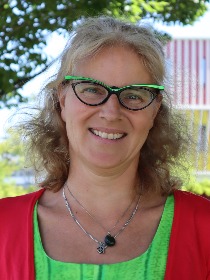Opinion | The countryside cannot be engineered

For a long time, we believed that it was possible to 'engineer' the Netherlands – and therefore the countryside. But now that the issues of climate change and the energy transition are looming, we are reaching the limits of what that engineering can achieve, says Tialda Haartsen, Professor of Rural Geography at the University of Groningen. And that means we need to rethink the way we design the countryside.
Written down by Marrit Wouda, Corporate Communicatie UG
Engineering rural land
‘In the past, we often thought that we could make any stretch of rural land suitable for any kind of activity, even if the soil wasn’t really suitable for that activity. We regulate water levels, and we use fertilizers and pesticides where necessary, all of which means we can farm everywhere. But we are now reaching the limits of what we can do in terms of engineering land. A low groundwater level is handy for farmers, as it allows them to grow crops optimally or spread their manure in early spring. But parts of the Netherlands are dropping further and further below sea level, and the summers are getting drier and drier. This is causing great damage to nature and making vast areas less suitable for construction. So, we need to move away from this idea of being able to engineer everything and take inspiration from how people used to live in balance with natural processes. The world has changed, of course, but we need to look for new guiding principles that will allow soil and water to be the determining factors, in a way that is fit for the 21st century.’
Volunteers and facilities
‘But rural areas are more than just farmland. People also live in small communities. These are hit even harder by the ageing population as young people move to the cities. On top of that, many facilities, especially in rural areas, depend on volunteers. A few decades ago, it was entirely possible to do unpaid work for the community in addition to running a family. For example, because only one parent worked outside the home. Today, this is increasingly difficult for many people, so most volunteer work is now done by retired people. When their health deteriorates, they are no longer able to do this kind of work, which puts pressure on the facilities.’
Engineering the village community
‘The current policy also assumes a certain degree of engineering in the village community. The idea is that if there is a need for facilities in a village, they will be created. For example, volunteers might start a care initiative, a sports facility, or a library. Besides the fact that volunteering is a huge drain on many people’s time, such community initiatives have to compete for funding. The question is whether this money could be better spent by the municipality directly on general facilities.’
Towards coherent policy
‘So, the countryside is not as engineerable as we thought, and many spatial changes are just around the corner. Also, for far too long, the countryside has been out of the picture. We have this perception that the city is dynamic, that the city is the place to be, that if you want to be successful you have to move to the city. As a result, we’ve forgotten that the city can’t exist without the countryside. It’s time for us to look together for new guiding principles for a liveable and workable countryside.’
Rural Geographies conference
Tialda Haartsen is the chief organizer of the third Rural Geographies conference, which will take place from 26 to 29 June 2023. Academics and policymakers from all over Europe will meet in Groningen to discuss liveability, the energy transition, climate change, and a long-term vision for rural areas. Keynote speakers include Johan Osinga, Director-General of the Ministry of Agriculture, Nature, and Food Quality, and Alexia Roupy from the European Commission.
More news
-
01 December 2025
The power of movement
